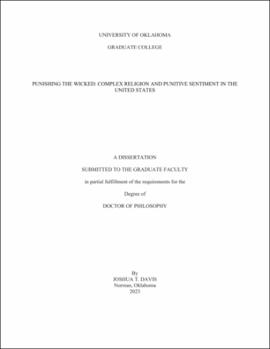| dc.description.abstract | The United States is exceptional in the scope and severity of its criminal justice system relative to similarly developed nations. An important precursor to the implementation of criminal justice policy is the underlying culture of punitiveness which supports expansive use of harsh sanctions for criminals. Prior research suggests that Americans’ attitudes toward formal social control are intimately tied to their religious life. Questions remain, however, regarding when, how, and for whom these aspects of religious life may bolster punitive sentiment. Building on studies which frame religious beliefs and practices as being situated within sophisticated networks of overlapping social identities, or what scholars have called complex religion, this dissertation assesses whether religion is associated with punitiveness per se, or if these associations are contextualized. The first chapter examines whether biblical literalism predicts beliefs that local courts are not sufficiently harsh on criminals. I find that biblical literalism is only associated with punitiveness among white Americans, and that this association is both emergent and growing. In Chapter 2, I examine how partisan identity intersects with religious practice to predict support for capital punishment. I find that attending religious services at least weekly increases opposition to the death penalty among Republicans, Democrats, and Independents, though the effect of service attendance does not overcome partisan support among Republicans. The final chapter investigates support for government sponsored religion and beliefs that prison sentences are too short. I find that belief in government sponsored religion amplifies punitive sentiment among white respondents and that education does not reduce punitiveness among supporters of state-religion. | en_US |
